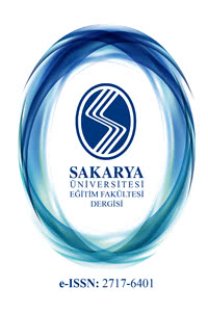Yaparak Yaşayarak Öğrenme Etkinliklerinin Öğrencilerin Bilimsel Süreç Becelerine Etkisi
Bilimsel süreç becerileri, yaparak—yaşayarak öğrenme etkinlikleri, işbirlikli öğrenme, öğretmen merkezli öğretim
___
- ADEY, P. S. & HARLEN, W. (1986). "A piagetian analysis of process skill test items”. Journal of Research in Science Teaching, 23, 707—726.
- ARENA, P. (1996). "The role of relevance in the acquisition of science process skills”. Australian Science Teachers Journal, 42 , 34—39.
- COLVTLL, M. & PATTİE, I. (2002). "The building blocks for scientific literarcy”. Hands on science, 3, 20-22 .
- GABEL, L. D. (1993). Introductory science skills. (Secaond Education), Waveland Pres, inc. U.S.A.
- GERMANN, PAUL J. & ROBERTA J. ARAM. (1996). "Student performances on the science process of recording data, drawing conclusion and providing evidence”. Journal of Research in Science Teaching, 33, 773—798.
- HARLEN, W. (1999). "Purposes and procedures for assessing science process skills”.Assessment in Education, 6, 129-144.
- HOFSTEİN , A & LUNETTA, N. V. (2004). "The laboratory in science education: foundations for the twenty—first century”. Wiley Periodicals, Inc. Science Education, 88, 28—54.
- HUPPERT, J., MİCHAL L. s & LAZAROWİTZ R. (2002). "Computer simulations in the high school: student” cognitive stages, science process skills and academic achievement in microbiology”. International Journal of Science Education, 24 , 803—821.
- JAWORSKY, B. (1994). Investigating Mathematics Teaching: A Constructivist
- Enquiry. London-Washington: The Falmer Pres. JOHNSON, D. W & JOHNSON, R. T. (1986). "Encouraging student/student interaction Washington D.C. : National Assocation for Research in Science
- Teaching (ERIC Document Reproduction Service No. ED 266960).
- MOHD, S. R. (2004). "The acquisition of integrated science process skills in a web-based learning environment”. Research in Science & Technological Education, , 23—40.
- MUĞALOĞLU, E., NAZLIÇİÇEK, N & ARDAÇ, D. (2002, Eylül). ”Bilimsel süreçlerin grup çalışmasıyla geliştirilmesinde öğrenme biçemlerirıin etkisi”. Orta
- Doğu Teknik Üniversitesi, V. Ulusal Fen Bilimleri ve Matematik Eğitimi Kongresinde Sunulan Bildiri, Ankara. PADİLLA, J. M., OKEY, RJ & GARRARD, K. (1984). “The effects of instruction on integrated science process skill achievement”. Journal of Research in Science Teaching ,30, 127—152.
- RAMİG, J.E., BAİLER, J & RAMSEY, J.M. (1995). Teaching science process skills. U.S.A.: McGraw-Hill Children’s Publishing.
- SCREEN, P. A. (1986). "Warwick process science”. School Science Review, 68, —16.
- SHAW, J. T. (1983). "The effect of a process—oriented curriculum upon problem solving ability”. Science Education, 67, 615—623.
- TOBİN, K., KAHLE, J.B & FRASER, B.J (1990) Windows into science classsrooms: problems associated with higher—level learning. Palmer Pres, London,
- WALTERS, Y.B & SOYIBO, K. (2001). "An analysis of high school students’ performance on five integrated science process skills”. Research in Science &
- Technological Education, 19 , 133—145. WHEATLEY, G. H. (1991). "Constructivist perspectives on science and mathematics leanıing”. Science Education,75, 9-21.
- B. Thermal Erkek Mart 1974 Hintli 1986
- A. Siddiqpi Erkek Aralık 1973 Pakistanlı 1986
- R. Johnson Bayan Mayıs 1974 İsveçli 1986
- R. Ali Erkek Ocak 1973 Endonezyalı 1986
- J. Martinez Erkek Ağustos 1973 İspanyol 1986
- ISSN: 1303-0310
- Yayın Aralığı: Yılda 2 Sayı
- Başlangıç: 2001
- Yayıncı: Sakarya Üniversitesi
Okul Öncesi Dönem Çocuklarının Oyunları ve Ailelerin Bu Konudaki Tutumları
Çocuk Edebiyatı Konulu Lisansüstü Çalışmalar İle İlgilli Bir Durum Araştırması
Türkçe Eğitimi Bölümü Öğrencilerinin İnternet Kullanma Yeterlilikleri (Sakarya Üniversitesi Örneği)
Onur İŞBULAN, Zeynep DEMİREL, Ahmet DEMİR
Ortaöğretim Kurumu Tercihinde Öğrencilerle İlgili Faktörlerin Etkisi
Gönül CENGİZ, Özcan E. AKGÜN, Osman TİTREK
OSMANLI MECLİS-İ MEBUSAN BİNASI ÇIRAĞAN SARAYI'NIN YANMASI VE YANKILARI
BASINDAKİ YANSIMALARIYLA AİLE İÇİ ŞİDDET
İlköğretim Okul Yöntecilerinin Öğretmenlerle İletişim Tarzları
İlköğretim Okulu Yöneticilerinde TÜKENMİŞLİK
Murat İSKENDER, Erkan YAMAN, Levent AYDIN
Yaparak Yaşayarak Öğrenme Etkinliklerinin Öğrencilerin Bilimsel Süreç Becelerine Etkisi
